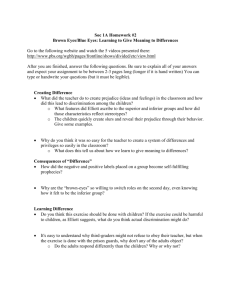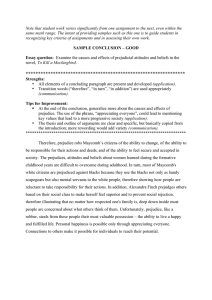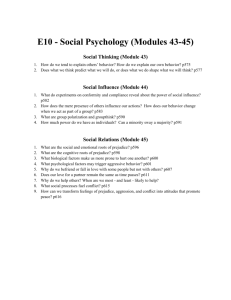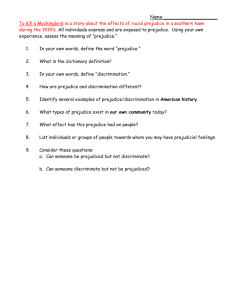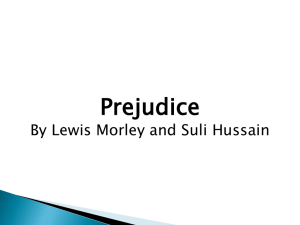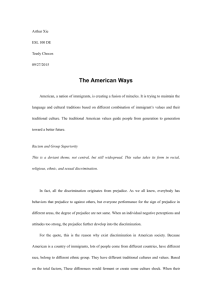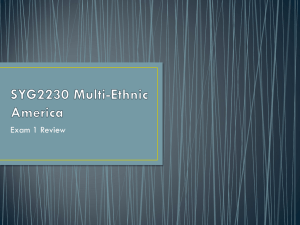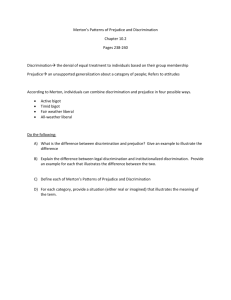Racial/Ethnic Prejudice and Discrimination: Causes, Patterns and Consequences
advertisement
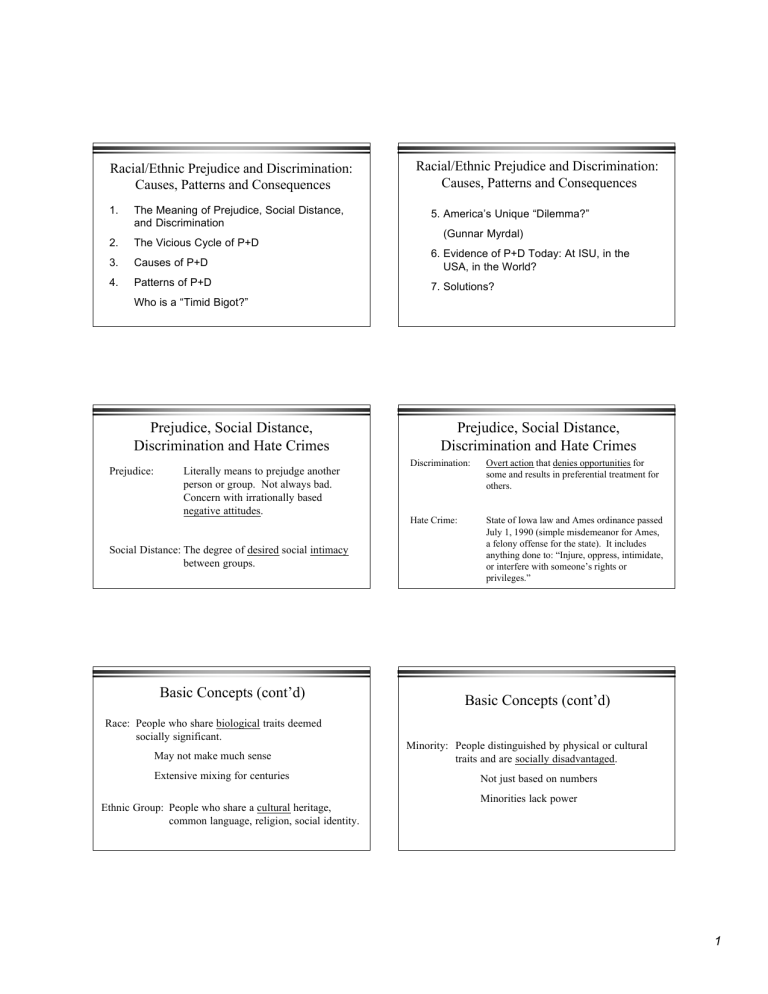
Racial/Ethnic Prejudice and Discrimination: Causes, Patterns and Consequences Racial/Ethnic Prejudice and Discrimination: Causes, Patterns and Consequences 1. The Meaning of Prejudice, Social Distance, and Discrimination 2. The Vicious Cycle of P+D 3. Causes of P+D 6. Evidence of P+D Today: At ISU, in the USA, in the World? 4. Patterns of P+D 7. Solutions? 5. America’s Unique “Dilemma?” (Gunnar Myrdal) Who is a “Timid Bigot?” Prejudice, Social Distance, Discrimination and Hate Crimes Prejudice: Literally means to prejudge another person or group. Not always bad. Concern with irrationally based negative attitudes. Social Distance: The degree of desired social intimacy between groups. Basic Concepts (cont’d) Race: People who share biological traits deemed socially significant. May not make much sense Extensive mixing for centuries Ethnic Group: People who share a cultural heritage, common language, religion, social identity. Prejudice, Social Distance, Discrimination and Hate Crimes Discrimination: Overt action that denies opportunities for some and results in preferential treatment for others. Hate Crime: State of Iowa law and Ames ordinance passed July 1, 1990 (simple misdemeanor for Ames, a felony offense for the state). It includes anything done to: “Injure, oppress, intimidate, or interfere with someone’s rights or privileges.” Basic Concepts (cont’d) Minority: People distinguished by physical or cultural traits and are socially disadvantaged. Not just based on numbers Minorities lack power 1 Do you know these people? Real Name U. S. Racial Composition New Name 1. Cherilyn Sarhisian 1. Cher 2. Cheryl Stoppelmoor 2. Cheryl Ladd 3. Robert Allen Zimmerman 3. Bob Dylan 4. Anna May Bullock 4. Tina Turner 5. Ramon Estervez 5. Martin Sheen 1990 1998 2005 2050 White 83.9 82.6 81.3 72.8 Black 12.3 12.7 13.2 15.7 American Indian 0.8 0.9 0.9 1.1 Why did they change their names? Racist U.S.? THE VICIOUS CYCLE 1 1 PREJUDICE & DISCRIMINATION BEGIN 4 2 2 AS A RESULT OF PREJUDICE & DISCRIMINATION A GROUP IS SOCIALLY DISADVANTAGED 3 THIS DISADVANTAGE IS INTERPRETED AS EVIDENCE THAT THE MINORITY GROUP IS INFERIOR 4 THIS CREATES RENEWED PREJUDICE & DISCRIMINATION 3 Theories of Prejudice 1. Scapegoat Theory (Frustrated and Disadvantaged Unfairly Blame Others.) 2. Authoritarian Personality (Rigid and Conforming Persons, See Moral Issues as Clear-Cut. Strongly Ethnocentric) 3. Cultural Theory: People Learn to be Prejudiced. (Learn Desired “Social Distance” To Keep From Other People.) 4. Conflict Theory of Prejudice (Prejudice Used To Justify Oppression of Others. Elites May Foster It To Divide People.) PREJUDICE & DISCRIMINATION PREJUDICE DISCRIMINATION YES NO BIGOT FAIR WEATHER LIBERAL TIMID BIGOT ALL WEATHER LIBERAL YES NO Women and Blacks in U.S.: “Minorities” Prejudice Toward Both Women Actually Numeric Majority Parallels: High Social Visibility Assigned a “Place” Originally Forms of Property “Superstitious” Unable to Vote “Emotional, Not Rational” “Inferior” Mental Endowment 2 Evidence of P + D Today: In U.S., World-Wide, ISU? Black Imprisonment Rates Weekly Earnings by Race and Gender: Hispanic Women $337 Hispanic Men Black Women $390 $400 Black Men $468 White Women White Men $468 $615 Total $523 Native Americans – greatest risk 3,109 per 100,100 South Africa 729 per 100,100 Life Expectancy at Birth Who Is Most Likely to Be a Victim of Violent Crime? Blacks, Whites, Asians, Hispanics, Native Americans USA Whites 75.2 years African Americans 69.2 years Evidence cont’d. • Univ. of Wisconsin “diversity” photo disaster is comparable to: • Ford Motor Co. of England “Faces at Ford” blunder Is the Univ. racist? Is Ford? Black-White – victim rates narrowing Whites – 82.2% of victims, 84.2% of population Blacks – 14.7% victims, 12.1% of population SOCIAL DISTANCE SCALE, SPRING 1999 RESPONSE CATEGORIES 1 2 3 4 5 6 7 CLOSE KINSHIP BY MARRIAGE VERY GOOD FRIENDS AS MY NEIGHBORS SAME WORK GROUP SPEAKING ACQUAINTANCE ONLY AS VISITORS TO MY COUNTRY EXCLUDE FROM MY COUNTRY “MINORITY GROUP” SCORE EXCLUDE ITALIANS 2.32 2% JEWS CANADIANS TURKS AFRICAN AMERICANS CHINESE GERMANS HOMOSEXUALS ARABS RUSSIANS AMERICAN INDIANS LAOTIANS ANGLO AMERICANS 2.52 2.18 3.05 2.31 2.88 2.20 4.11 3.37 2.75 2.46 2.96 2.07 1% 1% 2% 2% 4% 1% 21% 9% 3% 1% 5% 1% 3 CHANGE IN PREJUDICE CHANGE IN PREJUDICE 3.5 6 3 5 2.5 2 1975 1984 1999 1.5 1 4 1975 1984 1999 3 2 1 0.5 0 0 ITALIANS AFRICAN AMERICANS JEWS CHINESE TURKS RUSSIANS ARABS HOMOSEXUALS Are We All Prejudiced? GENDER 3.5 3 2.5 Stereotypes 1. Muslim religion supports terrorism Believed by Hispanics Whites 2. Catholics too controlled by church Asian Americans 57% Blacks 49% 3. Hispanics have too many children Asian Americans 68% Whites 50% 48% 41% 2 1.5 1 0.5 0 MALE FEMALE Are We All Prejudiced? (cont’d) Solutions? Stereotypes 4. Blacks want to live on welfare Believed by Asian Americans 31% Hispanics 26% How to react if your child uses racist language? 5. Jews choose money over people Blacks Hispanics 54% 43% How to react if your child is subject to racist abuse? 6. Asian-Americans are crafty and devious Hispanics Blacks 46% 41% Strategies for communities, organizations, societies? Harris poll for NCCJ, 1994 4 Social Strategy to Reduce Desired Social Distance Solutions? Solutions have roots based in conflict or functional theory: Conflict Functionalism Hate crime legislation Job creation/education Forced school busing Promote positive social interaction Affirmative action Promote diversity ABA call for ban on death penalty Parents teach tolerance Influence of Previous Contacts on Desired Social Distance Negative Not Close Close Positive Second most Third most Most S.D. desired Least Which is most favored? Parents’ Strategy to Reduce Prejudice Stereotyping may be one of first “skills” children learn, age 4-5. Be prejudiced by age of 7. Parent’s Strategy to Reduce Prejudice (cont’d) 1. Don’t tolerate ethnic jokes, slurs 2. Use books, TV, news as tools 3. Answer questions directly, e.g. why dark skin? (Melanin in skin) 4. Provide interaction opportunities 5. Check your own prejudices (Mayo Clinic, February 2000) Stereotyping may be one of first “skills” children learn, age 4-5. Be prejudiced by age of 7. 5
